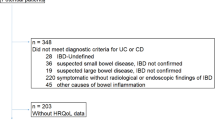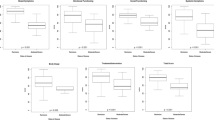Abstract
Purpose
Little is known about disease-specific health-related quality-of-life (HRQoL) changes over time in paediatric patients with inflammatory bowel disease (IBD), and about their associations with baseline medical characteristics.
Methods
In this study, 153 paediatric patients with IBD from the multicentre prospective Swiss IBD cohort study were included at baseline. Of these, 90 patients were analysed at a 1-year follow-up. Medical data were extracted from hospital records, while HRQoL data were measured using the standardized, self-report disease-specific IMPACT-III questionnaire.
Results
The IBD diagnosis of the included children was made an average of 2.0 years before their baseline assessment. Over the 1-year follow-up period, a significant increase in overall HRQoL and in the HRQoL domain ‘physical functioning’ was evident. On multivariate analysis, overall HRQoL changes over time were predicted by baseline HRQoL, baseline disease activity, and disease activity changes over time. HRQoL improvements were significantly associated with decreases in physician-assessed disease activity. Children reporting a low baseline HRQoL and children with inactive or mildly-active disease experienced greater improvements.
Conclusions
Children with more severe baseline disease activity had the greatest risk for HRQoL deterioration over the 1-year follow-up period. However, among possible factors that might influence HRQoL changes over time, the child’s medical characteristics explained only a small proportion of their variability in our sample. We, therefore, recommend that researchers and clinicians focus on factors that are not incorporated within the multidimensional HRQoL concept if they seek to gain better insights into factors that influence HRQoL changes over time in children with IBD.
Similar content being viewed by others
References
Kelsen, J., & Baldassano, R. N. (2008). Inflammatory bowel disease: The difference between children and adults. Inflammatory Bowel Diseases, 14, 9–11. doi:10.1002/Ibd.20560.
Eaden, J. A., Abrams, K. R., & Mayberry, J. F. (2001). The risk of colorectal cancer in ulcerative colitis: A meta-analysis. Gut, 48(4), 526–535.
Mackner, L. M., Greenley, R. N., Szigethy, E., Herzer, M., Deer, K., & Hommel, K. A. (2013). Psychosocial issues in pediatric inflammatory bowel disease: Report of the North American Society for Pediatric Gastroenterology, Hepatology, and Nutrition. Journal of Pediatric Gastroenterology and Nutrition, 56(4), 449–458. doi:10.1097/MPG.0b013e3182841263.
Matza, L. S., Swensen, A. R., Flood, E. M., Secnik, K., & Leidy, N. K. (2004). Assessment of health-related quality of life in children: A review of conceptual, methodological, and regulatory issues. Value in Health, 7(1), 79–92. doi:10.1111/j.1524-4733.2004.71273.x.
Gallo, J., Grant, A., Otley, A. R., Orsi, M., MacIntyre, B., Gauvry, S., et al. (2014). Do parents and children agree? Quality-of-life assessment of children with inflammatory bowel disease and their parents. Journal of Pediatric Gastroenterology and Nutrition, 58(4), 481–485. doi:10.1097/Mpg.0000000000000236.
Gray, W. N., Graef, D. M., Schuman, S. S., Janicke, D. M., & Hommel, K. A. (2013). Parenting stress in pediatric IBD: Relations with child psychopathology, family functioning, and disease severity. Journal of Developmental and Behavioral Pediatrics, 34(4), 237–244. doi:10.1097/Dbp.0b013e318290568a.
Hill, R. J., Lewindon, P. J., Muir, R., Grange, I., Connor, F. L., Ee, L. C., et al. (2010). Quality of life in children with Crohn disease. Journal of Pediatric Gastroenterology and Nutrition, 51(1), 35–40. doi:10.1097/MPG.0b013e3181c2c0ef.
Marcus, S. B., Strople, J. A., Neighbors, K., Weissberg-Benchell, J., Nelson, S. P., Limbers, C., et al. (2009). Fatigue and health-related quality of life in pediatric inflammatory bowel disease. Clinical Gastroenterology and Hepatology, 7(5), 554–561. doi:10.1016/j.cgh.2009.01.022.
Perrin, J. M., Kuhlthau, K., Chughtai, A., Romm, D., Kirschner, B. S., Ferry, G. D., et al. (2008). Measuring quality of life in pediatric patients with inflammatory bowel disease: Psychometric and clinical characteristics. Journal of pediatric gastroenterology and nutrition, 46(2), 164–171. doi:10.1097/MPG.0b013e31812f7f4e.
Otley, A. R., Griffiths, A. M., Hale, S., Kugathasan, S., Pfefferkorn, M., Mezoff, A., et al. (2006). Health-related quality of life in the first year after a diagnosis of pediatric inflammatory bowel disease. Inflammatory Bowel Diseases, 12(8), 684–691.
van der Zaag-Loonen, H. J., Grootenhuis, M. A., Last, B. F., & Derkx, H. H. (2004). Coping strategies and quality of life of adolescents with inflammatory bowel disease. Quality of life research: An international journal of quality of life aspects of treatment, care and rehabilitation, 13(5), 1011–1019.
Pittet, V., Juillerat, P., Mottet, C., Felley, C., Ballabeni, P., Burnand, B., et al. (2009). Cohort profile: The Swiss Inflammatory Bowel Disease Cohort Study (SIBDCS). International Journal of Epidemiology, 38(4), 922–931. doi:10.1093/ije/dyn180.
Lennard-Jones, J. E. (1989). Classification of inflammatory bowel disease. Scandinavian Journal of Gastroenterology Supplement, 170, 2–6. (discussion 16–19).
Turner, D., Otley, A. R., Mack, D., Hyams, J., De Bruijne, J., Uusoue, K., et al (2007). Development, validation, and evaluation of a pediatric ulcerative colitis activity index: A prospective multicenter study. Gastroenterology, 133(2), 423–432. doi:10.1053/j.gastro.2007.05.029.
Kappelman, M. D., Crandall, W. V., Colletti, R. B., Goudie, A., Leibowitz, I. H., Duffy, L., et al. (2011). Short pediatric Crohn’s disease activity index for quality improvement and observational research. Inflammatory Bowel Diseases, 17(1), 112–117. doi:10.1002/ibd.21452.
Griffiths, A. M., Nicholas, D., Smith, C., Munk, M., Stephens, D., Durno, C., et al. (1999). Development of a quality-of-life index for pediatric inflammatory bowel disease: Dealing with differences related to age and IBD type. Journal of pediatric gastroenterology and nutrition, 28(4), S46–S52.
Otley, A., Smith, C., Nicholas, D., Munk, M., Avolio, J., Sherman, P. M., et al. (2002). The IMPACT questionnaire: A valid measure of health-related quality of life in pediatric inflammatory bowel disease. Journal of pediatric gastroenterology and nutrition, 35(4), 557–563.
Beaton, D. E., Bombardier, C., Guillemin, F., & Ferraz, M. B. (2000). Guidelines for the process of cross-cultural adaptation of self-report measures. Spine, 25(24), 3186–3191. doi:10.1097/00007632-200012150-00014.
Werner, H., Landolt, M. A., Buehr, P., Koller, R., Nydegger, A., Spalinger, J., et al. (2014). Validation of the IMPACT-III quality of life questionnaire in Swiss children with inflammatory bowel disease. Journal of Crohn’s & Colitis, 8(7), 641–648. doi:10.1016/j.crohns.2013.11.025.
Cohen, J. (1992). A power primer. Psychological Bulletin, 112(1), 155–159. doi:10.1037/0033-2909.112.1.155.
Field, A. (2009). Discovering statistics using SPSS. London: Sage Publications.
Rubin, D. B. (1987). Multiple imputation for nonresponse in surveys. New York: Wiley.
van Buuren, S., & Groothuis-Oudshoorn, K. (2011). mice: Multivariate Imputation by Chained Equations in R. Journal of Statistical Software, 45(3), 1–67.
Van Buuren, S., Brand, J. P. L., Groothuis-Oudshoorn, C. G. M., & Rubin, D. B. (2006). Fully conditional specification in multivariate imputation. Journal of Statistical Computation and Simulation, 76(12), 1049–1064. doi:10.1080/10629360600810434.
Altman, D. G., & Bland, J. M. (1995). Statistics notes—absence of evidence is not evidence of absence. British Medical Journal, 311(7003), 485–485.
Kazak, A. E., Kassam-Adams, N., Schneider, S., Zelikovsky, N., Alderfer, M. A., & Rourke, M. (2006). An integrative model of pediatric medical traumatic stress. Journal of Pediatric Psychology, 31(4), 343–355. doi:10.1093/jpepsy/jsj054.
Price, J., Kassam-Adams, N., Alderfer, M. A., Christofferson, J., & Kazak, A. E. (2016). Systematic review: A reevaluation and update of the integrative (Trajectory) model of pediatric medical traumatic stress. Journal of Pediatric Psychology, 41(1), 86–97. doi:10.1093/jpepsy/jsv074.
Hayes, R. J. (1988). Methods for assessing whether change depends on initial value. Statistics in Medicine, 7(9), 915–927.
Tu, Y. K., & Gilthorpe, M. S. (2007). Revisiting the relation between change and initial value: A review and evaluation. Statistics in Medicine, 26(16), 3205–3206. doi:10.1002/sim.2538.
Bland, J. M., & Altman, D. G. (1994). Statistics notes. 2. Regression towards the mean. British Medical Journal, 308(6942), 1499–1499.
Bland, J. M., & Altman, D. G. (1994). Some examples of regression towards the mean. BMJ (Clinical research ed.), 309(6957), 780.
Faul, F., Erdfelder, E., Lang, A. G., & Buchner, A. (2007). G*Power 3: A flexible statistical power analysis program for the social, behavioral, and biomedical sciences. Behavior Research Methods, 39(2), 175–191. doi:10.3758/Bf03193146.
Hyams, J. S., Ferry, G. D., Mandel, F. S., Gryboski, J. D., Kibort, P. M., Kirschner, B. S., et al. (1991). Development and validation of a pediatric Crohns-disease activity index. Journal of Pediatric Gastroenterology and Nutrition, 12(4), 439–447.
Turner, D., Hyams, J., Markowitz, J., Lerer, T., Mack, D. R., Evans, J., et al. (2009). Appraisal of the pediatric ulcerative colitis activity index (PUCAI). Inflammatory Bowel Diseases, 15(8), 1218–1223. doi:10.1002/ibd.20867.
Acknowledgements
We thank all the children and parents who participated in this study. A special thank goes to Luciano Molinari, PhD, for many discussions about the topic of this study.
Funding
This work was supported by a research grant from the Swiss National Science Foundation [Grant 3CSC0_13427 to the Swiss IBD Cohort].
Author information
Authors and Affiliations
Consortia
Corresponding author
Ethics declarations
All procedures performed in studies involving human participants were in accordance with the ethical standards of the institutional and/or national research committee and with the 1964 Helsinki declaration and its later amendments or comparable ethical standards.
Conflict of interest
The authors declare that they have no conflict of interest.
Informed consent
Informed consent was obtained from all parents of the children included in this study.
Rights and permissions
About this article
Cite this article
Werner, H., Landolt, M.A., Buehr, P. et al. Changes in health-related quality of life over a 1-year follow-up period in children with inflammatory bowel disease. Qual Life Res 26, 1617–1626 (2017). https://doi.org/10.1007/s11136-017-1513-9
Accepted:
Published:
Issue Date:
DOI: https://doi.org/10.1007/s11136-017-1513-9




